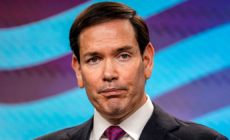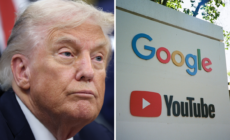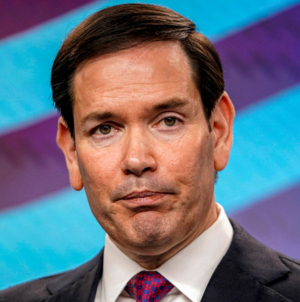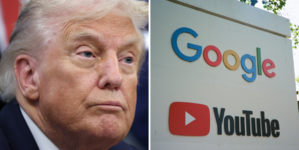-
Saudi Arabia vs. Norway: How to Watch, Odds, U-20 Preview - 24 mins ago
-
Marco Rubio says ongoing Gaza peace talks are ‘not yet’ the end of the war - 34 mins ago
-
Cowboys Vet Sends His Brother a Message Before Battle vs Jets - 37 mins ago
-
Nigeria vs. Colombia: How to Watch, Odds, U-20 Preview - about 1 hour ago
-
How to Watch Newcastle United vs Nottingham Forest: Live Stream Premier League, TV Channel - about 1 hour ago
-
English far-right leader Tommy Robinson invited to Israel - about 1 hour ago
-
NFL International Series: How to Bet on the Vikings vs Browns NFL London Game - 2 hours ago
-
Eric Dane vows to ‘fight to the last breath’ against ALS in visit to Washington - 2 hours ago
-
Donald Trump Pleads for ‘Google/YouTube’ Change Before Midterms - 2 hours ago
-
Pope Leo, after Trump critique, urges Catholics to help immigrants - 2 hours ago
Big Tech Feels the Noose Tighten Over H-1B Visas
America’s largest technology companies face mounting pressure over their reliance on foreign workers as the Trump administration imposes steep new fees on H-1B visas and Congress demands detailed disclosures about hiring practices.
For years, America’s tech firms scaled fast using a steady pipeline of foreign talent; this week’s measures—a steep new fee, new selection priorities favoring higher pay and skill, and heightened congressional scrutiny—suddenly raise the cost and reputational risk of continuing those hiring patterns.
On September 19, President Donald Trump signed a proclamation requiring employers to pay a $100,000 fee for each new H-1B petition filed after September 21. The rule is scheduled to remain in place for 12 months, unless extended.
The administration said the move was designed to deter abuse of the visa program and protect U.S. workers from job displacement. Existing H-1B holders, renewals, and amendments are not subject to the new fee, and there is a provision for further exemptions.
“On rhetoric alone, this is significant for the president to have arrived at this conclusion, and I see that as a very good thing,” Kevin Lynn, executive director of the Institute for Sound Public Policy and founder of U.S. Tech Workers, which has advocated for H-1B reforms, told Newsweek.
He said that it was significant that lawmakers were taking notice of the unease being felt about the H-1B, after what critics feel has been years of inaction, but “The bottom line is, the proclamation was, unfortunately, an example of poor execution, which with misleading messaging,” Lynn added.
Is Big Tech On Board With Trump’s $100k Fee?
In the week since the announcement, immigration attorneys, employers, and workers themselves have been left confused over whether the president actually has the power to do this, while the State Department and Department of Homeland Security (DHS) have been forced to clarify what is and is not happening.
“The Executive Branch does have the power to block the entry of immigrants who are not seen as in the national interest to allow in, if it justifies why the ban is needed,” Julia Gelatt, associate director of the U.S. immigration policy program at the bipartisan Migration Policy Institute, told Newsweek.
“The Supreme Court affirmed this authority during the first Trump administration when it allowed the third iteration of the travel ban sometimes known as the ‘Muslim ban’ to go forward.”
During last Friday’s Oval Office announcement, Trump and his Commerce Secretary Howard Lutnick said that companies that often benefit from the H-1B the most – big tech – were on board with paying the $100,000 fee to keep the best and brightest coming in. But no CEOs were on hand to confirm this, and there has been near silence from industry leaders in the days since.
Doug Rand, a former senior advisor to the director of U.S. Citizenship and Immigration Services (USCIS) under the Biden administration, told Newsweek that the policy had little chance of surviving.
“When Howard Lutnik and Donald Trump say that everyone’s a fan of something, why would anybody believe that? It’s not like they did their diligence,” Rand said. “I think that you’re going to see challenges.
“The [Attorney General] of California is thinking about a challenge, you’ve seen calls for plaintiffs coming out from various immigration law firms that have, frankly, sued administrations of both parties over the past several years over policy they didn’t like. So, I think there’s going to be more than one lawsuit.”
While the likes of Amazon, Google, and Meta, which all benefit from the H-1B, may be able to absorb the new fees, the start-up sector likely won’t, fueling fears that U.S. innovation will be stifled.
Will A Wage-Weighted Selection Process Work?

Trump’s announcement was followed by a much-anticipated plan to change the H-1B selection process. Under the plan, shared by DHS this week, petitions offering higher salaries or involving “higher-skilled” roles would receive priority when applications exceed the annual cap of 85,000 new visas.
Moving to a wage-based selection process taps into the idea held by many H-1B skeptics that tech companies hire foreign workers because they can pay lower wages than they would to American-born workers, particularly in STEM fields.
“It was a way to bring in cheap labor, foreign labor, and to displace Americans, because understand there is no requirement to demonstrate that the company has looked for an American worker before filing an LCA, Labor Condition Application,” Lynn said. “So, again, it’s not—they’re not looking for the best and brightest. If they were, they wouldn’t be using a lottery to come up with a final 65,000 to get the H-1B.”
The system planned by DHS would work based on wage levels or brackets, rather than actual salaries combined with skill levels. This could mean a person’s seniority in a field, for example, an acupuncturist with many years of experience, could qualify for a visa because they earn a high wage for their field, rather than possess skills or talents not available in the U.S., while a PhD student in a niche field may not qualify, because they do not meet certain criteria.
That has left some feeling skeptical over whether the administration’s plans for change will benefit Americans in the way they are being touted, including those who have advocated for changes to the system.
Jeremy Neufeld, director of immigration policy at the Institute For Progress (IFP), a science and innovation think tank in Washington, D.C., told Newsweek that while the H-1B system is not delivering “what it says on the tin”, these plans do not target mid-level talent or outsourcing companies spamming the lottery system.
“60% of America’s top AI start-ups were founded by immigrants, hugely disproportionate to their overall percentage in terms of the population,” Neufeld said. “That wouldn’t be possible, it just simply wouldn’t have happened, if it weren’t for the H-1B program.”
Neufeld, who has advocated for reforming the H-1B lottery while warning about expelling talent, said that the U.S. had, so far, been able to compete with China when it comes to AI innovation, despite the Asian country having four times the U.S. population.
“The fact that we’re that we’re able to keep up against that is because we don’t have to rely on our population alone, we can draw on the world’s best talent,” he said. “The results are evident when you look at who’s actually founding our most successful start-ups: disproportionately likely to be immigrants.
“Both the policies directly would target that and just add a level of legal uncertainty for people who are considering coming to this country. If we end up undermining this talent pipeline, we’re going to be feeling the effects of this for years to come.”
Congress, Department of Labor Piling On
In Congress, there now appears to be bipartisan agreement, or at least concern, over the visa and its potential for abuse, leading to poor outcomes for American-born graduates.
“When legislators and their staffs went off for August recess, they were hit in the face with people saying: ‘My kid has graduated from Stamford with a computer science degree, we can’t get him out of the house because he can’t get work’,” Lynn said, feeling that this sentiment pushed lawmakers to pay attention.

Earlier this week, Republican Iowa Senator Chuck Grassley and Democratic Illinois Senator Dick Durbin—the chair and ranking member on the Senate Judiciary Committee—sent letters to companies including Amazon, Apple, Microsoft, Meta, Alphabet, JPMorgan, and Deloitte, asking them for data on the number of H-1B employees, wages paid, and whether U.S. staff have been displaced, citing concerns about layoffs occurring alongside continued visa hiring.
“In evaluating the high unemployment rate for American tech workers, we cannot ignore the massive, ongoing layoffs ordered by you and your peers in Big Tech C-suites over the past few years … At the same time you have been laying off your employees, you have been filing H-1B visa petitions for [thousands of] foreign workers,” Grassley and Durbin wrote in the letters.
The companies have been asked to respond by early October. Lawmakers suggested that further legislative or enforcement actions could follow if the disclosures indicate misuse of the program. At the same time, the Department of Labor, which oversees wage reporting on work visas, put companies on notice that it would be cracking down on similar H-1B system abuses.
Rand told Newsweek that the H-1B, like much of the U.S. immigration system, had gone largely unchanged since 1990, and that it was this lack of action by Congress that led to the situation now.
“If you care about fraud and abuse, then you go after companies committing fraud and abuse. You don’t trash the entire program,” he said. “And by the way, the company’s committing fraud and abuse are typically not the companies that are hiring graduates of our best universities.
“So, it’s a deliberate mischaracterization of the scale of the problem and who’s perpetrating the problem. It’s deliberate because, at the end of the day, this administration isn’t really worried about fraud and abuse. They just want to turn off the flow of immigrants to the United States.”
The changes and scrutiny come at a sensitive moment for immigration in the U.S., with the H-1B seeming to bear the brunt of the legal immigration debate.
Now, tech companies that have long relied on H-1B visas to fill critical engineering and research roles must weigh higher costs, uncertainty over new domestic talent, and the reputational risks of congressional oversight.
One thing unifying those Newsweek spoke was a feeling that it was good that immigration policy was actually being scrutinized and opened up to meaningful change, while still aiming to keep high-skilled workers coming to the U.S. to help fuel innovation.
“The best of all possible worlds is they just scrapped it because, like I said, we do not need the H-1B,” Lynn said. “We want the best and brightest? We have the O visa, and it’s unlimited. The only thing it requires is you have to be a really, really bright, talented individual.”
Neufeld said it was widely understood that the H-1B has been used to undercut American wages, and that he was hopeful Congress could finally act – at the very least to reform the lottery selection process.
“Which is, I think, widely understood to be basically insane that we are deciding who is going to be part of Team America and help drive our economic fortunes by random chance,” he told Newsweek. “We wouldn’t pick our Olympic team by random chance. Why are we picking our high school immigrants this way?”
Source link




























